Are you considering getting a Karelian Bear Dog as a pet? If you are, then you might be interested to know that this breed is not your typical cuddly lapdog. Karelian Bear Dogs are known for their strength, courage, and loyalty, making them ideal for hunting and guarding. However, these dogs require a lot of training and attention to ensure that they are well-behaved and safe around people and other animals. In this article, we will discuss some of the characteristics and needs of Karelian Bear Dogs to help you determine if this breed is the right fit for you.
Breed Category: Working
Country of Origin: Finland
Average Size:54-60 cm
Average Weight:20-23 kg
Average Life Span: 10-12 years
Grooming Requirements: Moderate
Exercise Requirements:High
History and Origin
The Karelian Bear Dog, also known as the Karjalankarhukoira, is a breed of dog that originated in the Karelia region of Finland and Russia. The breed was developed for hunting large game, particularly bears, and has been used for this purpose for centuries.
The Karelian Bear Dog is believed to have descended from ancient Spitz-type dogs that were brought to the region by early settlers. These dogs were then bred with local hunting dogs to create a breed that was well-suited for hunting in the harsh northern climate.
The breed was first recognized by the Finnish Kennel Club in 1946, and since then has become increasingly popular in Finland and other parts of Europe. In recent years, the breed has also gained popularity in North America, where it is used for hunting, search and rescue, and as a family pet.
The Karelian Bear Dog is a medium-sized dog, typically weighing between 40 and 60 pounds. It has a thick, dense coat that is black with white markings, and a distinctive curled tail. The breed is known for its courage, loyalty, and intelligence, and is highly trainable.
In addition to its hunting abilities, the Karelian Bear Dog has also been used as a guard dog and as a military dog. During World War II, the breed was used by the Finnish army to guard military installations and to search for wounded soldiers.
Despite its popularity, the Karelian Bear Dog is still considered a rare breed, with only a few thousand dogs in existence worldwide. The breed is recognized by the American Kennel Club and the United Kennel Club, but is not yet recognized by the Kennel Club in the United Kingdom.
In recent years, efforts have been made to preserve the breed and to promote its use as a hunting dog. The Karelian Bear Dog Association of America was founded in 1997 to promote the breed in North America, and similar organizations exist in other parts of the world.
Overall, the Karelian Bear Dog is a fascinating breed with a rich history and a unique set of skills. Whether used for hunting, search and rescue, or as a family pet, this breed is sure to impress with its intelligence, loyalty, and courage.
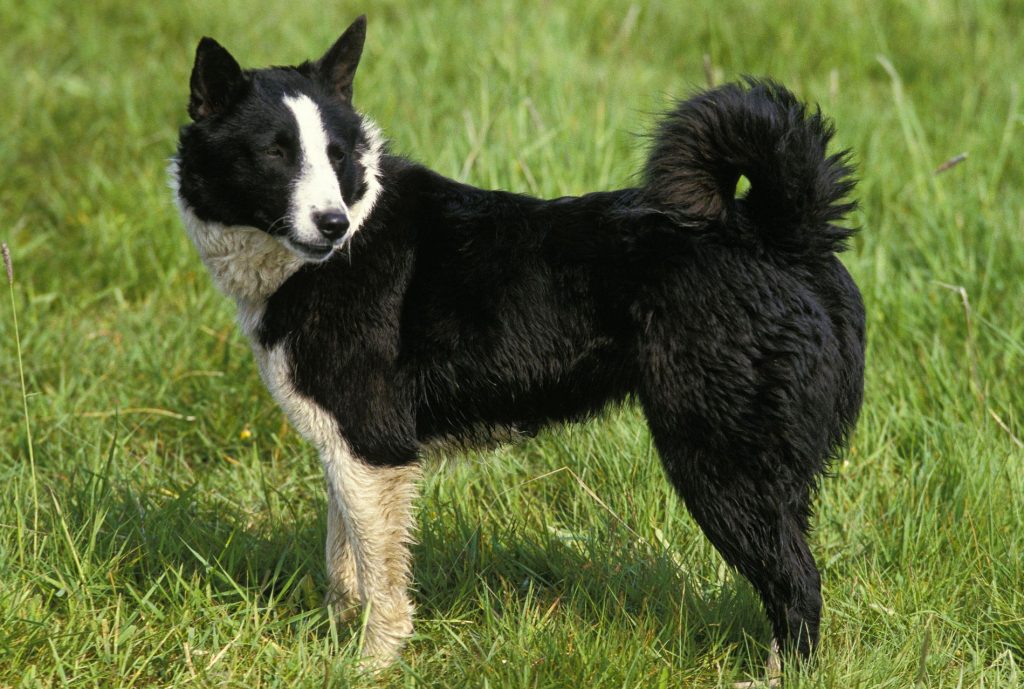
Size and Breed Category
The Karelian Bear Dog is a medium-sized breed that typically weighs between 20-23 kg and stands at a height of 54-60 cm at the shoulder. They have a sturdy and muscular build, with a thick double coat that is black with white markings. The breed is known for their sharp senses and agility, making them excellent hunters and trackers. They have a strong prey drive and are particularly skilled at hunting large game such as bears and moose. Due to their high energy levels and need for regular exercise, they are best suited to active households with plenty of outdoor space for them to run and play.
The Karelian Bear Dog is classified as a spitz-type breed, which is a group of dogs that share similar physical characteristics such as pointed ears, a curled tail, and a thick coat. They are a working breed that originated in the Karelia region of Finland and Russia, where they were used for hunting and protecting livestock. The breed is known for their loyalty and protective nature, making them excellent guard dogs. They are also highly intelligent and trainable, although they can be independent and stubborn at times. Due to their strong instincts and protective nature, they require early socialization and training to ensure they are well-behaved and obedient around people and other animals.
Fur Length and Colour
The fur of the Karelian Bear Dog is typically short and dense, providing excellent protection against the harsh weather conditions of its native Finland. The fur is also water-resistant, allowing the dog to swim and hunt in wet environments without becoming weighed down. The fur colour is predominantly black with white markings on the chest, legs, and tail. The white markings can vary in size and shape, with some dogs having only small patches while others have larger areas of white. The black fur can also have a slight reddish-brown tint in certain lighting conditions. Overall, the fur of the Karelian Bear Dog is both functional and aesthetically pleasing.
The length of the fur on the Karelian Bear Dog can vary depending on the season and climate. During the winter months, the fur can grow longer and thicker to provide additional warmth and insulation. In the summer, the fur may become shorter and thinner to help regulate the dog’s body temperature. The fur is also relatively easy to maintain, requiring only occasional brushing to remove loose hair and prevent matting. The black and white colouration of the fur is not only visually striking but also serves as camouflage in the dog’s natural habitat. This allows the Karelian Bear Dog to blend in with its surroundings and approach prey undetected.
Termperament and Trainability
Karelian Bear Dogs are known for their independent and strong-willed temperament. They are a breed that requires an experienced owner who can provide firm and consistent training. These dogs are highly intelligent and have a natural instinct to hunt, which can make them difficult to train for obedience. However, with the right approach, Karelian Bear Dogs can be trained to excel in a variety of activities, including tracking, agility, and search and rescue. It is important to note that these dogs have a high prey drive and may not be suitable for households with small pets.
When it comes to trainability, Karelian Bear Dogs are known for their determination and persistence. They are a breed that thrives on challenges and enjoys learning new skills. However, they can also be stubborn and may require a lot of patience and positive reinforcement during training. It is important to establish a strong bond with your Karelian Bear Dog early on in their training to ensure that they are receptive to your commands. These dogs are also highly energetic and require plenty of exercise and mental stimulation to prevent boredom and destructive behavior. Overall, Karelian Bear Dogs are a breed that requires a dedicated and experienced owner who can provide them with the training and attention they need to thrive.
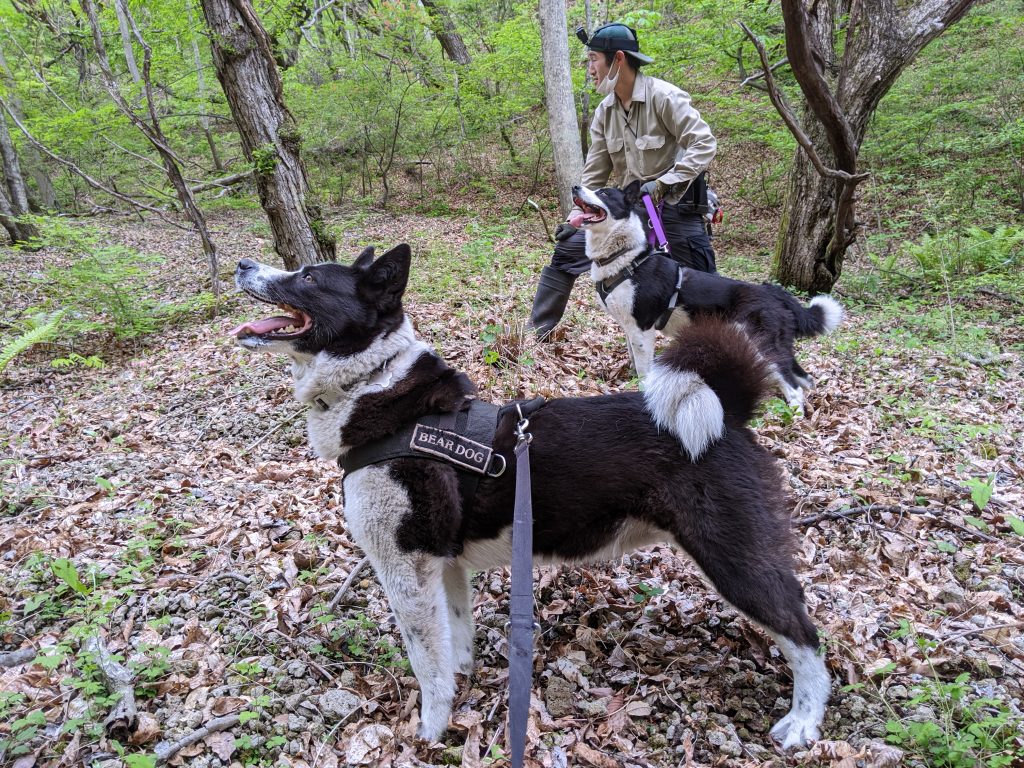
Known Health Conditions
Karelian Bear Dogs are prone to certain health conditions that owners should be aware of. One of the most common issues is hip dysplasia, which is a genetic condition that affects the hip joint. This can cause pain, lameness, and arthritis in the affected joint. To prevent hip dysplasia, it is important to only breed dogs that have been screened and cleared of the condition. Additionally, maintaining a healthy weight and providing regular exercise can help reduce the risk of developing hip dysplasia.
Another health concern for Karelian Bear Dogs is progressive retinal atrophy (PRA), which is a degenerative eye disease that can lead to blindness. PRA is also a genetic condition, so it is important to only breed dogs that have been screened and cleared of the disease. Unfortunately, there is no cure for PRA, but early detection can help slow the progression of the disease. Regular eye exams by a veterinarian can help catch PRA early on, allowing for appropriate management and care.
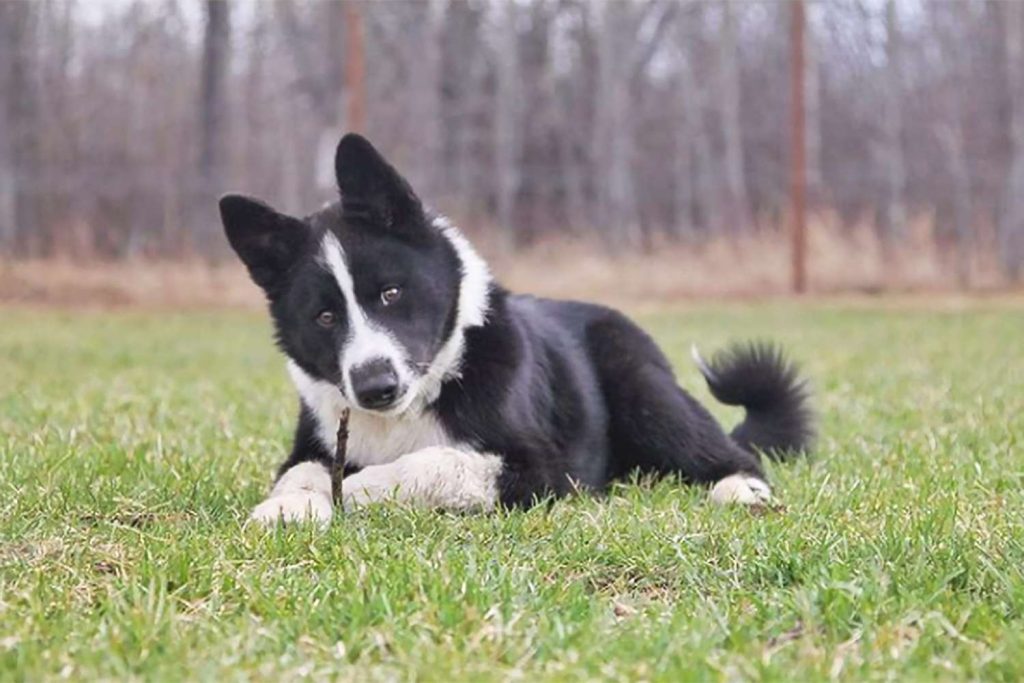
Openness to Strangers
Karelian Bear Dogs are known for their friendly and welcoming nature towards strangers. They are a breed that is naturally curious and inquisitive, which makes them eager to meet new people. When encountering strangers, Karelian Bear Dogs are typically calm and composed, showing no signs of aggression or fear. They are quick to approach and greet strangers, often wagging their tails and sniffing around to get to know them better. This friendly disposition makes them great companions for families with children or those who frequently have visitors.
Despite their openness to strangers, Karelian Bear Dogs are still highly protective of their owners and their territory. They have a strong sense of loyalty and will not hesitate to defend their family and home if they feel threatened. This protective instinct is especially evident when encountering other animals, as Karelian Bear Dogs have a natural prey drive and may view smaller animals as potential threats. However, with proper training and socialization, Karelian Bear Dogs can learn to coexist peacefully with other pets and animals. Overall, their friendly and welcoming nature towards strangers makes them a great choice for those looking for a loyal and sociable companion.
Playfulness Level
The Karelian Bear Dog is a highly energetic and playful breed that requires plenty of exercise and mental stimulation to keep them happy and healthy. They are known for their love of play and their ability to entertain themselves for hours on end. Whether it’s chasing after a ball, playing tug-of-war, or simply running around in circles, these dogs are always up for a good time. They are also highly intelligent and enjoy learning new tricks and commands, making them a great choice for owners who are looking for a dog that can keep up with their active lifestyle.
Despite their playful nature, Karelian Bear Dogs are also known for their strong hunting instincts and their ability to work independently. They are highly skilled at tracking and hunting game, and are often used by hunters and gamekeepers to help control populations of wild animals. However, despite their hunting abilities, these dogs are also known for their gentle and affectionate nature, and make great family pets for those who are willing to put in the time and effort to train and socialize them properly. Overall, the Karelian Bear Dog is a highly versatile and playful breed that is well-suited to a wide range of lifestyles and environments.
Suitability as a Pet for Children
Karelian Bear Dogs are highly energetic and intelligent dogs that require a lot of exercise and mental stimulation. They are known for their loyalty and protective nature, making them great watchdogs. However, they can be quite independent and stubborn, which may make them difficult to train for inexperienced owners. They have a strong prey drive and may not be suitable for households with small pets. Overall, Karelian Bear Dogs can make great pets for active and experienced families who are willing to put in the time and effort to properly train and socialize them.
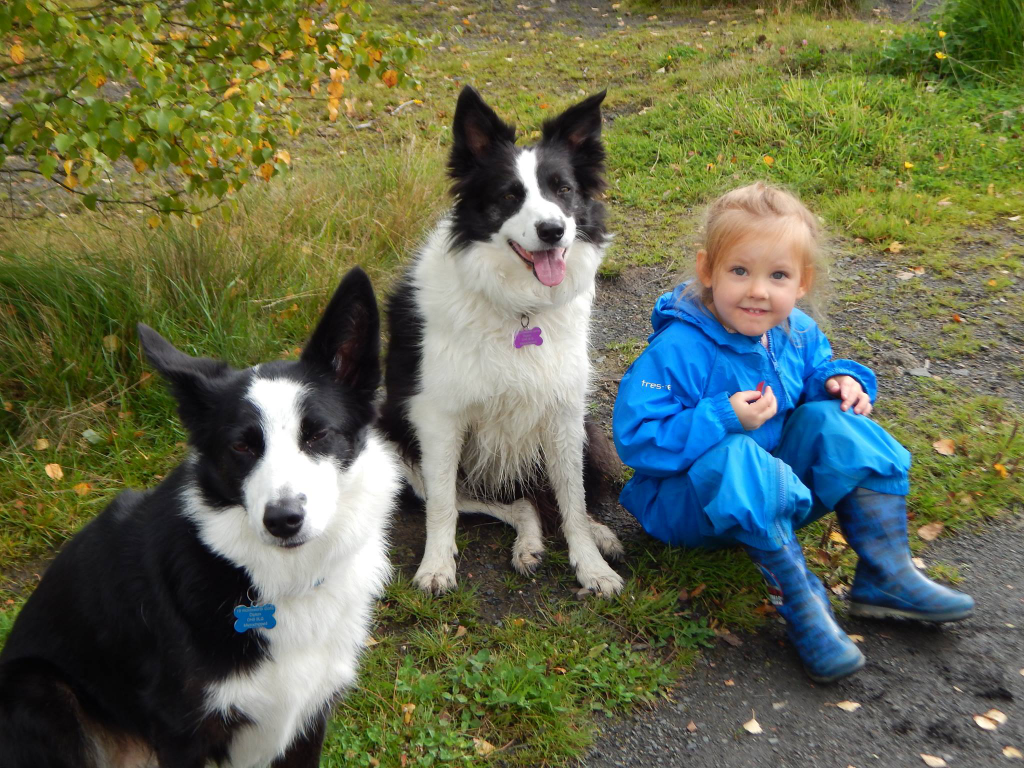
Exercise Needs
Karelian Bear Dogs are highly active and energetic dogs that require a significant amount of exercise to maintain their physical and mental health. As a medium-sized breed, they need at least 60 minutes of daily exercise, which can be achieved through a combination of walks, runs, and playtime. These dogs have a strong prey drive and love to chase, so it’s important to keep them on a leash or in a secure, fenced area during exercise. Additionally, Karelian Bear Dogs thrive on mental stimulation, so incorporating training and interactive games into their exercise routine can help keep them engaged and happy.
In addition to regular exercise, Karelian Bear Dogs benefit from having a job or purpose to fulfill. These dogs were originally bred for hunting and guarding, and they still have a strong instinct to protect their family and territory. Providing them with tasks such as obedience training, agility courses, or even hiking and camping trips can help satisfy their need for a job and keep them mentally stimulated. It’s important to note that Karelian Bear Dogs are not suitable for apartment living or inactive households, as they require a lot of space and attention to thrive. With proper exercise and mental stimulation, however, these dogs make loyal and loving companions for active families.

Suitability for a Multi-Pet Family
Karelian Bear Dogs have a reputation for being independent and strong-willed. They are known for their hunting abilities and are often used to hunt large game such as bears and moose. When it comes to getting along with other pets, it really depends on the individual dog and their socialization. Some Karelian Bear Dogs may get along well with other pets, while others may be more aggressive towards them. It is important to socialize them early and properly to ensure they can coexist peacefully with other animals.
Housing Requirements
Karelian Bear Dogs require a spacious and secure living environment that allows them to move around freely. They are highly active dogs that need plenty of exercise, so a large yard or access to open spaces is essential. A fenced-in area is also necessary to prevent them from wandering off and getting into trouble. Additionally, they need a comfortable and warm shelter to retreat to during cold or wet weather. The shelter should be well-insulated and provide adequate protection from the elements.
In terms of indoor housing, Karelian Bear Dogs are adaptable and can live in a variety of settings. However, they prefer to be close to their owners and thrive in a home environment where they can receive plenty of attention and affection. They are not suited to apartment living as they require ample space to move around and burn off energy. A house with a large, secure backyard is ideal for these dogs. They also need access to fresh water and a comfortable bed to rest in after a long day of play and exercise.
Summary
Karelian Bear Dogs have been traditionally used for hunting and as guard dogs in their native Finland. They are highly energetic and require a lot of exercise and mental stimulation. Due to their strong prey drive and protective nature, they may not be suitable for households with small children or other pets. Karelian Bear Dogs require experienced owners who can provide them with proper training and socialization.
Karelian Bear Dog FAQS
Karelian Bear Dogs can be stubborn and independent, making them challenging to train. Consistent and positive reinforcement training is recommended.
Yes, Karelian Bear Dogs are excellent guard dogs and have a strong protective instinct.
Karelian Bear Dogs can be good with children if they are socialized properly from a young age.
Karelian Bear Dogs are not recommended for apartment living as they require a lot of space and exercise.
Karelian Bear Dogs are generally healthy, but they can be prone to hip dysplasia and eye problems.
Yes, Karelian Bear Dogs shed a moderate amount throughout the year and heavily during shedding season.
The cost of owning a Karelian Bear Dog can range from $1,000 to $2,500 per year, including food, vet bills, and grooming expenses.
Karelian Bear Dogs require at least 1-2 hours of exercise per day.
A Karelian Bear Dog can grow up to 54-60 cm in height.
The average weight of a Karelian Bear Dog is between 20-23 kg.
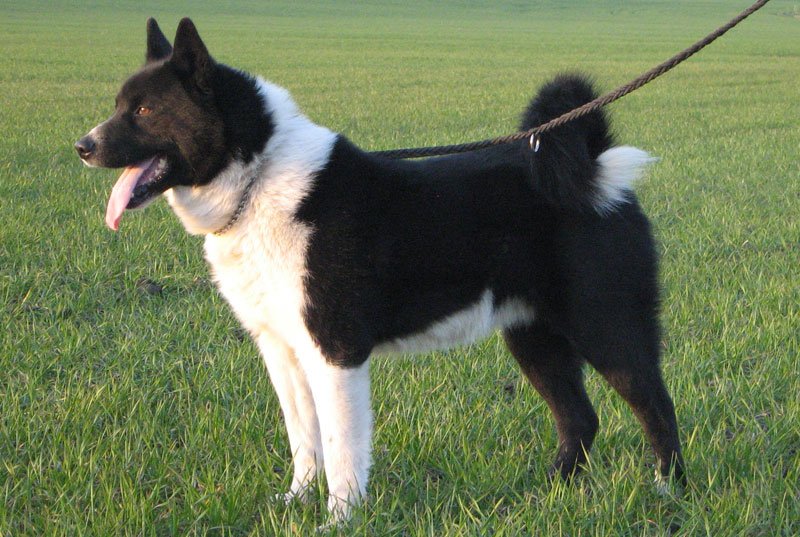
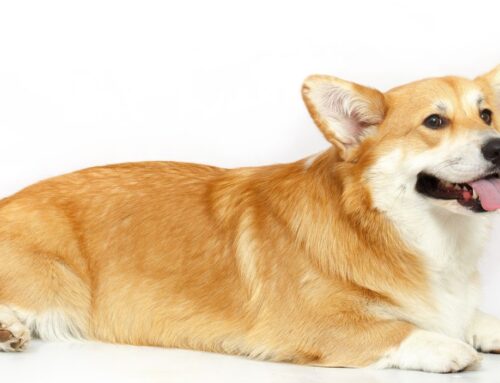
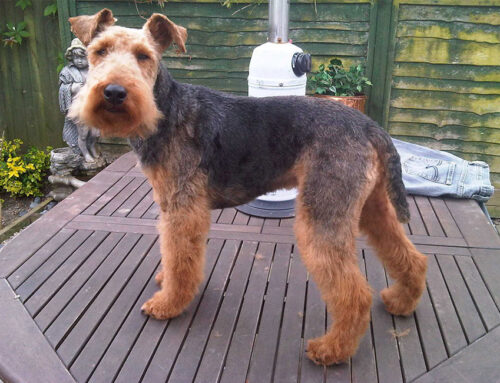
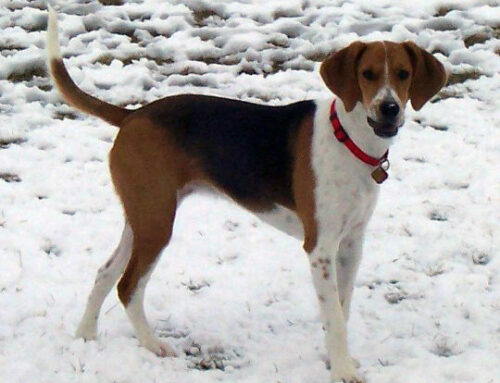
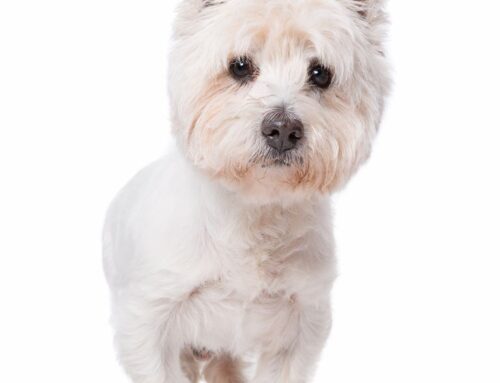
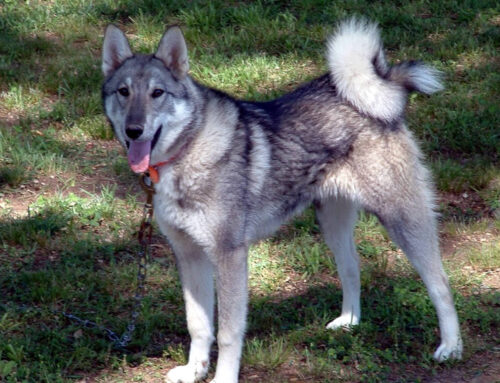
Leave A Comment